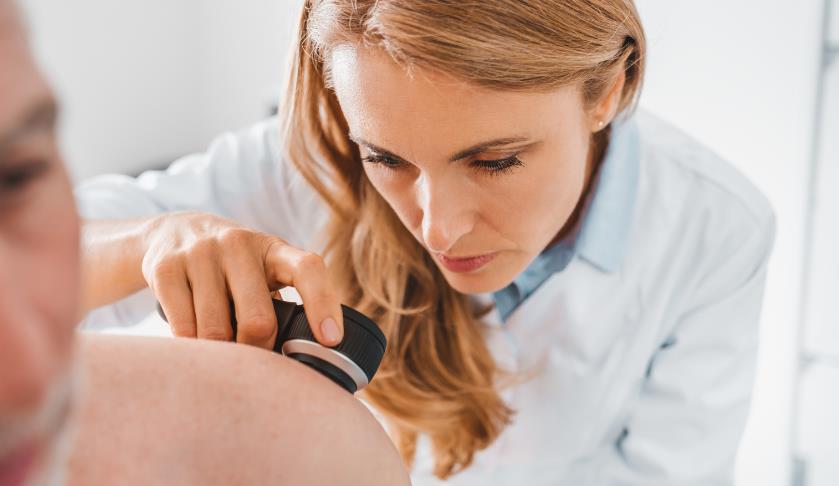Table of Contents
Caring for your skin is essential at any age. As we age, so does our skin. The importance of taking care of it helps to keep it looking healthy. To keep our skin feeling and looking healthy, many of us invest in products and treatments to help us achieve this goal.
However, there might be moments when we experience skin issues. These issues can be uncomfortable, irritating and can be upsetting to see. These are some of the most common skin issues people will likely experience.
Preventing Skin Problems And Spotting The Warning Signs
Common Skin Issues
Visiting the doctor for a skin condition is not uncommon. Many of us will see the doctor if we are concerned about skin irritations, and some will try to resolve the issue with home remedies and pharmacy treatments. However, knowing the most common skin issues can help us identify the best course of action to help ease the issue. Some of the most common skin conditions include:
Chickenpox
 Chickenpox commonly affects younger children. Although it is possible to get chickenpox twice, it is unusual. Children under 10 are the most likely to get chickenpox. However, adults can also be affected by chickenpox if they have not had them before. The highly infectious skin condition can spread anywhere across the body. There are three stages to chickenpox. The first is small spots appearing across the body, the second stage is the spots turning to blisters, and the last step is the blisters becoming scabs. Chickenpox can be an unpleasant experience, especially as it is strongly advised not to scratch or touch the spots.
Chickenpox commonly affects younger children. Although it is possible to get chickenpox twice, it is unusual. Children under 10 are the most likely to get chickenpox. However, adults can also be affected by chickenpox if they have not had them before. The highly infectious skin condition can spread anywhere across the body. There are three stages to chickenpox. The first is small spots appearing across the body, the second stage is the spots turning to blisters, and the last step is the blisters becoming scabs. Chickenpox can be an unpleasant experience, especially as it is strongly advised not to scratch or touch the spots.
Psoriasis
Similar to chickenpox, psoriasis can be an unpleasant experience. Psoriasis often comes from dry patches on the skin, which is sometimes covered in scales. These dry patches can be sore or itchy. Others will experience psoriasis in cycles, with each flare-up lasting weeks or months before it calms down. To learn more about psoriasis, Patient has gone into greater detail about the skin condition, highlighting everything you should know about psoriasis. Learning about the condition could help to identify the issue sooner and seek the right treatment to ease the itchiness.
Eczema
 Eczema is a common long-term skin condition. The condition causes a person’s skin to become red, dry, and itchy; sometimes, it cracks. Similar to chickenpox, eczema is more commonly found in children. However, it is a skin condition that can affect countless older adults. For many adults, eczema flare-ups can be caused by new products or feeling stressed. Eczema flare-ups can occur on any part of the body. The most common areas include the inside knees, elbows, cheeks and hands. Many can control their flare-ups with creams, while others might need their doctor’s prescribed treatments.
Eczema is a common long-term skin condition. The condition causes a person’s skin to become red, dry, and itchy; sometimes, it cracks. Similar to chickenpox, eczema is more commonly found in children. However, it is a skin condition that can affect countless older adults. For many adults, eczema flare-ups can be caused by new products or feeling stressed. Eczema flare-ups can occur on any part of the body. The most common areas include the inside knees, elbows, cheeks and hands. Many can control their flare-ups with creams, while others might need their doctor’s prescribed treatments.
Spot The Warning Signs
Each skin condition will have specific symptoms that differentiate it from other conditions. As mentioned, chickenpox starts as spots that blister and turn into scabs, whilst psoriasis is dry patches that can sometimes be covered in scales. Look for common symptoms with specific skin conditions. Knowing this will help you to take the correct treatment route to help with the issue.
After symptoms have been spotted, ensure that they are closely monitored. Take note of any changes, such as a rash spreading or a change in appearance. Should there be any changes of great concern, for instance, if the skin problems have become excruciatingly painful or if you begin to feel unwell, then seeking medical advice should be your next step.
Tips On Prevention
Experiencing skin conditions is an unpleasant experience. Aside from being uncomfortable, it can also be distressing to some. Recent figures reveal that 70% admitted that scars and skin conditions impact their confidence. Now that you know what the signs are and what the most common types of skin issues are, learning how to prevent them is the next crucial step. Keep reading to find some top tips to help with prevention.
Avoid Further Irritation
Should you experience a flare-up, to help avoid worsening the issue, ensure that you are not irritating the affected skin any more than it already is. This means not applying any new products you have not tried to help with the issue. Use products you know your skin doesn’t react to and treatments that have helped in the past. Additionally, consider the choice of clothing you wear.
 If you are experiencing a flare-up, wearing clothes that could aggravate the skin might cause significant discomfort. Keep track of new products used that caused flare-ups. Compare these products’ ingredients to see if a common ingredient is shared in each that could be causing your flare-ups. Knowing what ingredient could be causing flare-ups can help you to avoid future issues. When purchasing a new product, you can check the ingredients list for potential triggers. This can help you to prevent potential flare-ups in the future.
If you are experiencing a flare-up, wearing clothes that could aggravate the skin might cause significant discomfort. Keep track of new products used that caused flare-ups. Compare these products’ ingredients to see if a common ingredient is shared in each that could be causing your flare-ups. Knowing what ingredient could be causing flare-ups can help you to avoid future issues. When purchasing a new product, you can check the ingredients list for potential triggers. This can help you to prevent potential flare-ups in the future.
Keep Stress Levels Low
Of course, trying to manage stress levels is easier said than done. Life can throw us many obstacles we didn’t expect, some of which can cause our stress levels to rise. High-stress levels can trigger some skin conditions. Flare-ups occur due to an individual being overwhelmed by stress. Whilst it can be difficult, keeping stress levels low will help prevent flare-ups. Understandably, some situations are naturally stressful, and low-stress levels can be challenging. Finding ways to remain calm will help minimise the chances of a flare-up.
Wearing SPF Daily
The easiest way to help prevent skin damage is to wear SPF. Whether it is a gloriously sunny summer’s day or a gloomy winter morn, SPF is essential. Our skin is always susceptible to the sun’s rays, even on the cloudiest of days. Wearing SPF can help to keep our skin protected.
 If our skin is consistently exposed to the sun, it can increase our chances of developing issues such as skin cancer. Wearing SPF consistently can help to reduce your chances of developing skin cancer. Not wearing SPF can also lead to discolouration and wrinkles. A simple and easy way to help keep your skin looking young and youthful for longer is to wear your SPF daily.
If our skin is consistently exposed to the sun, it can increase our chances of developing issues such as skin cancer. Wearing SPF consistently can help to reduce your chances of developing skin cancer. Not wearing SPF can also lead to discolouration and wrinkles. A simple and easy way to help keep your skin looking young and youthful for longer is to wear your SPF daily.
Seeking Help When Unsure
For the most part, you will likely know the cause of skin irritations and flare-ups. It could result from trying a new skincare product or sampling new food. If this is the case, you know what to stop using or no longer consume due to the reaction you cause. However, if you experience skin irritations or issues that you are unsure of the cause, you may need health support, you better seek professional help for their expert medical opinion. It might not be anything serious, but having it checked by a professional can ease any concerns you might have. If it were likely to be something serious, they could discuss the next best steps.
In Summary
Skin issues can affect a vast range of people. Some are more common in certain age groups than others, for instance, chickenpox. Others are more common in certain genders. Each one will have a course of treatment that is most likely to work and recommendations to treat a flare-up. Knowing how to prevent skin issues and the signs can tremendously help. It means a person can know what steps to take when they have spotted any skin issues. They can treat it and reduce the risk of the problem spreading or worsening. Instead, they can live more comfortably, thanks to their early detection and treatment of a skin issue.



